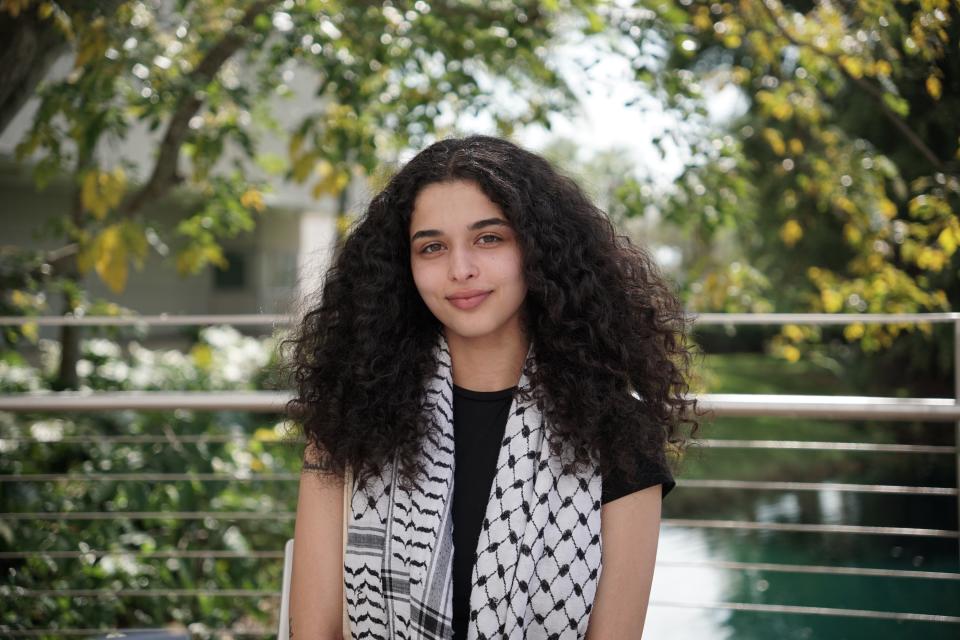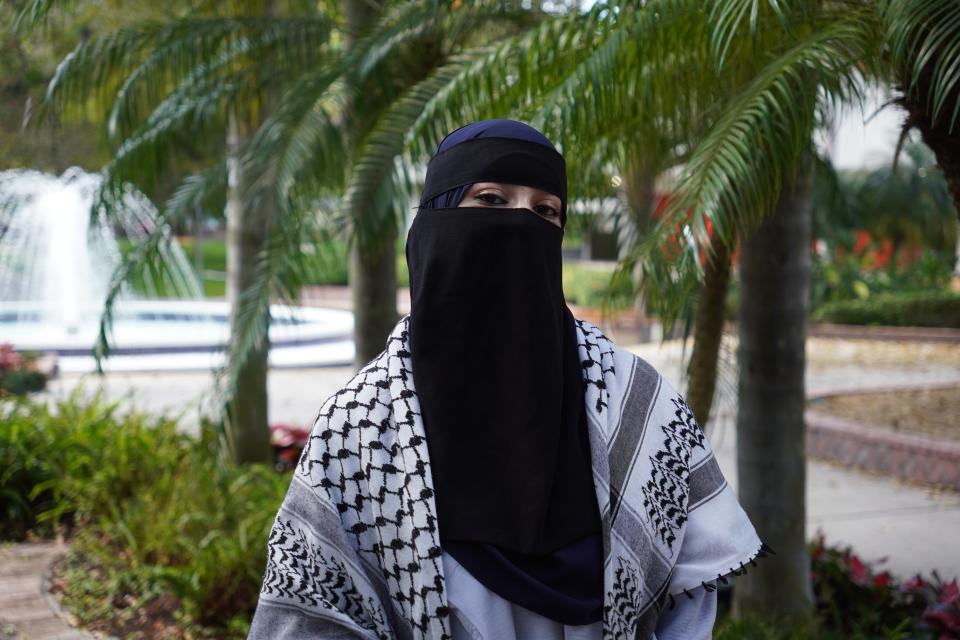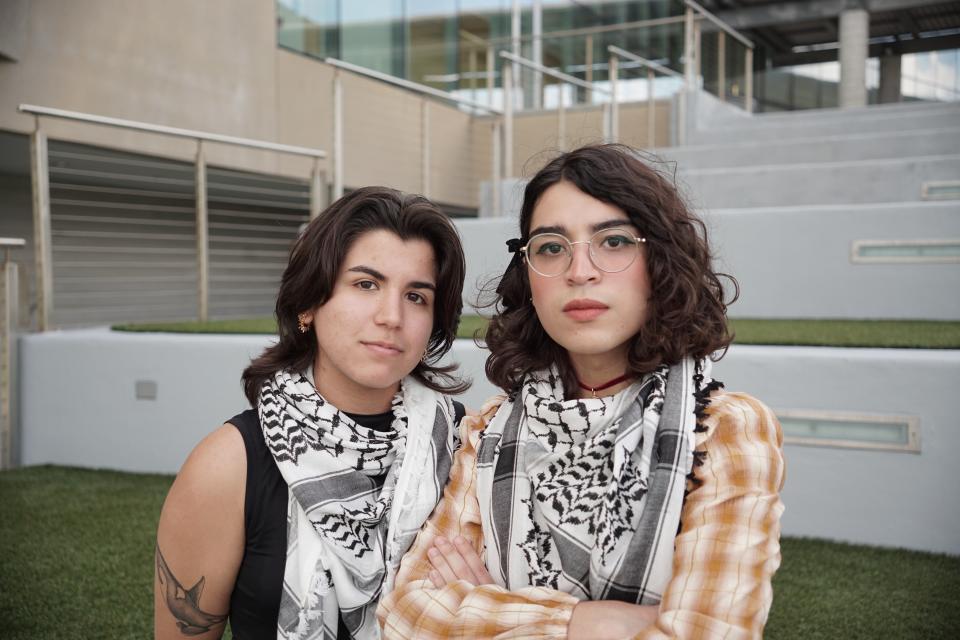Pro-Palestine Student Protesters in Florida Face Strict State, Campus Laws

JVP
It’s a challenging time to be a student activist in Florida — especially, some local students say, if you’re advocating against the war in Gaza. After Hamas attacked Israel on October 7 — killing approximately 1,200 Israeli civilians and taking more than 200 hostages — college campuses have seen increasing tension over the conflict, which has now killed more than 33,000 people in Gaza, according to the Gaza Health Ministry.
While this turmoil is affecting students nationwide, those in Florida are contending with notably strict state and campus laws aimed at restricting their freedom of speech and assembly. "Free speech is far from being alive and well. It's certainly not on life support, but free speech is in danger here in the state of Florida," Miami-based civil rights attorney Melba Pearson told Teen Vogue.
On October 24, the State University System of Florida (SUS) issued a deactivation order for all chapters of Students for Justice in Palestine across the state (the order said there are at least two). The SUS said the groups' alleged “material support of terrorism” — which members of Students for Justice in Palestine have strongly denied — prompted the ban.
Other schools have banned SJP chapters, but Florida is the only state where the public university system has issued a sweeping ban. Despite the attempt, Florida officials said they don’t plan to enforce the deactivation order and a federal court ruled as such in January.
The Florida legislature also tried to introduce a bill (that recently died in committee) that would have required universities to submit information about certain students who were found to "promote foreign terrorist organizations" to Homeland Security. The bill would have made students associated with these organizations ineligible for in-state tuition and financial aid. The bill, activists warned, did not define what “promoting” means and could have been used as a broad censorship tool.
While the most extreme of these measures did not come to pass, they can still have a chilling effect on students: “[H.B. 465] caused a lot of distress,” says Tara Mahmoud, a student at Florida International University in Miami and a member of FIU’s Students for Justice in Palestine. “I mean, people have said it out loud: ‘I want to come, but I’m afraid.’ Just because of my activism. I feel like I can get my aid taken away,” Mahmoud told Teen Vogue.

And while the state’s actions targeted toward students organizing for Palestine haven’t moved forward, other attacks on student speech have. The Tampa Five were arrested while protesting governor Ron DeSantis’s policies on diversity and LGBTQ+ rights, and a contested “anti-riot” state legislation could give police more discretion to arrest demonstrators, making it more dangerous to protest.
Pearson noted that the consequences of these attempts to restrict free expression go well beyond college campuses. “Every single legislative session for at least the last three to four years has seen attempts to erode the ability of Floridians to express themselves and discuss different points of view and raise their voices in terms of protest,” she said.
One of the most significant examples is legislation that creates a 25-foot, no-go zone around working police officers and first responders while attending to an emergency. The final version of the bill, which will go into effect on November 1, removed a provision protecting peaceful video recording or eyewitness observation.
"We understand that policing is a tough job and we understand that situations can be very fluid… but [this bill] is clearly designed to intimidate people. So rather than pulling out their phone and recording when they see something problematic, they are like, ‘You know what? Let me not do anything,’” Pearson said.

Local legislatures in Florida are also attempting to put some restrictions in place for when and where protestors can exercise their First Amendment rights. The city of Miami Beach recently passed a resolution setting “parameters for reasonable time, place, and manner restrictions” for protests. Before approving the measure, city commissioners discussed several pro-Palestinian protests held in Miami Beach, according to the Miami Herald.
Ella Fies, a Miami-based member of Jewish Voice for Peace (JVP), said this measure speaks to the biased perspective of local and state leadership, who are doing "everything they can to try and minimize the power that we are inevitably undeniably building."
On March 11, JVP organized a demonstration at the Miami Beach Convention Center a couple of days before the resolution officially passed. The group passed out pamphlets explaining the intersection of climate justice and Palestinian liberation, Fies said. Soon after activists arrived at the venue, local police reportedly ordered the group to relocate to one of the designated free speech zones.
"[The police] told us about the free speech zone they had created for us," Fies said. "It was across the street, behind a building, so nobody could see us. We went to a different location where we could actually leaflet to the people who were attending the symposium."
Pearson said that if it's proven to work, this legislation could serve as a model for other local governments across the state. "It only takes one testing ground to see how it works," Pearson said.
According to local police, the protestors were relocated to ensure security for “high-level officials” attending the conference. “Miami Beach police department established a security zone around the convention center.” the department told Teen Vogue in an email. “A demonstration zone was created within Pride Park [a public park next to the west side of the convention center] to provide a forum to exercise those rights.”
Some students see these bills as scare tactics to deter them from advocating for Palestine. "We have international students — Palestinian international students especially — and the atmosphere has been very much repressive," said Joel Nuñez, a student at Florida State University, and president of Tallahassee Students for a Democratic Society.
“A lot of international students from Arab and Muslim countries come out in support of Palestine. It's a cause that hits close to home for them,” Nuñez told Teen Vogue. “ But they're also the easiest group to target because they don't want to lose their visa status.”
Formerly known as FSU Students for a Democratic Society, Tallahassee SDS was deregistered as a recognized student organization after the group organized a protest during a board of trustees meeting and was cited for a code of conduct violation.
"A lot of people were scared," Nuñez said, “Especially since we got deregistered, people were afraid to affiliate with us. They think they're gonna get some type of code of conduct charge.” Nuñez said that after the organization was deactivated, their average meeting attendance dropped by half.
In the background of all of these conversations, the 2024 presidential election looms large. In other states like Michigan, young Democratic voters cast “uncommitted” ballots rather than vote for Joe Biden in the primary election, signaling their disapproval of the president’s handling of the conflict in Gaza. But that option doesn’t exist in Florida, where the Democratic State Party voted to place only Biden on the primary ballot.
“There's been a lot of debate over whether the swing states should vote for Biden just to try to not get Trump to win,” said Judith Chavarria, a member of FIU’s Young Democratic Socialist of America. “We're not blind; Trump is a great danger. And if Trump wins the presidential election in November, it will have been Biden's fault,” Chavarria told Teen Vogue.
“It will be his fault," Chavarria said, "and his administration's fault for having ignored so many Americans who have been calling for a ceasefire in Gaza and greater protection of their rights.”

Some voters, like Mahmoud, see the contest between Biden and Trump as a choice between “the lesser of two evils.” “I genuinely feel like there's no other choice for people but to start building community and learning and educating ourselves on how we have more power than the president," Mahmoud said.
Stay up-to-date with the politics team. Sign up for the Teen Vogue Take
Originally Appeared on Teen Vogue
More great activism coverage from Teen Vogue:

